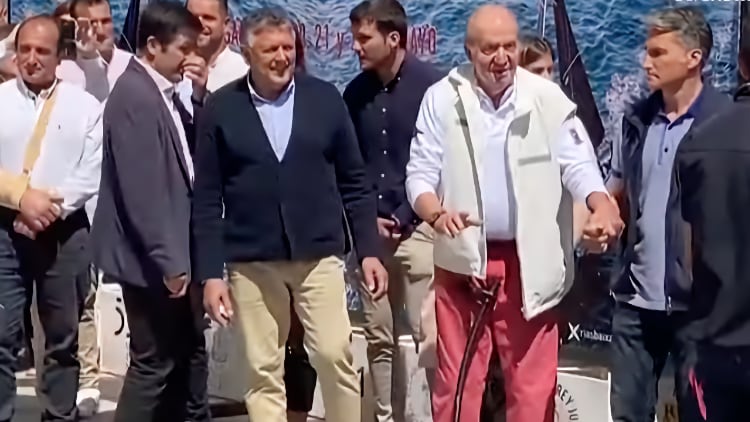Ángel Collado
The trip to Spain by the king emeritus, Juan Carlos I, also divides the Cabinet of Pedro Sánchez. This time the Government offers a division of roles between Sanchez supporters who demand public explanations from the former head of State and communists who take the opportunity to campaign against the constitutional Monarchy. The head of the Executive, in his own style, lets everyone do what they want, while the opposition accuses him of neglecting his duties.
Even some PSOE leaders, such as the president of the Junta de Castilla-La Mancha, Emiliano García-Page, warns that his party should not play along with those who go “against the institution”. The regional president is referring to Sánchez’s conglomerate of partners and allies, from the extreme left of Podemos and its various brands to the Catalan and Basque independentists.
The emeritus’ visit, after almost two years of residing in the United Arab Emirates, is yet another episode in the internal contradictions of the coalition government. Since coming to power, Sánchez has boasted of controlling the Public Prosecutor’s Office, especially after putting his first justice minister and PSOE deputy, María Dolores Delgado, in charge of it. Last March, the Public Prosecutor’s Office closed the investigations into don Juan Carlos for possible tax offences.
According to the argumentation now being drawn up in the Moncloa Palace, Sánchez and the ministers of the socialist sector repeat that the former head of state must give the explanations that he did not have to give to the Prosecutor’s Office. While the communist ministers and separatist allies raised the tone and the level of insults to the emeritus, described directly as a “delinquent” or “thief”, the socialist ministers added that he also had to apologise, although they did not specify what crime he was accused of.
Sánchez presents himself as a ruler who respects the institution of the Monarchy, even as a promoter of measures that will involve its modernisation with more transparency, and has renounced promoting the end of the inviolability of the King’s figure in the Constitution, as he promised for some months.
Podemos and the pro-independence parties that support the social-communist Executive declare themselves anti-monarchist and republican. In the case of the party founded by Pablo Iglesias, its historical reference point is the Second Spanish Republic. The project of the Catalan and Basque separatists of Bildu (a formation inherited from the political arm of ETA) is to create their own republics.
Sánchez’s partners and allies add to the insults to don Juan Carlos the contempt for the current monarch, Felipe VI, to draw a “republican horizon” that liquidates the “regime of ’78“. This is how they refer to the current democratic system, the parliamentary Monarchy, born of consensus and the Constitution voted for at the time.
There is a sector of the PSOE, represented by some regional barons such as García-Page, who feel themselves to be the continuators of the ’78 consensus, in which the socialists, then led by Felipe González, were part of. But Sánchez governs with republicans from all quarters and prefers to keep a low profile when his partners attack the institution that also represents the unity of the nation.
The far left and separatists cultivate their electoral base when they campaign against the parliamentary Monarchy. Allegations about the personal and fiscal behaviour of Juan Carlos I have given them support for their new offensive without the head of government being willing or able to stop them. Hence the opposition, with the Popular Party at the forefront, accuses Sánchez of damaging the prestige of state institutions, yesterday the secret services over the Pegasus case, today the Monarchy, in order to remain in power without upsetting his allies.
García-Page’s concern is shared by other regional leaders of the PSOE (especially in Extremadura and Aragón) who see the alliances of the president of their party with all kinds of republicans as a burden for the upcoming regional elections. Sánchez wants to extend the legislature until the end, December 2023, but before that the regional elections will come, just a year from now, and it will be García-Page and company who will be the first to be examined at the ballot box.






